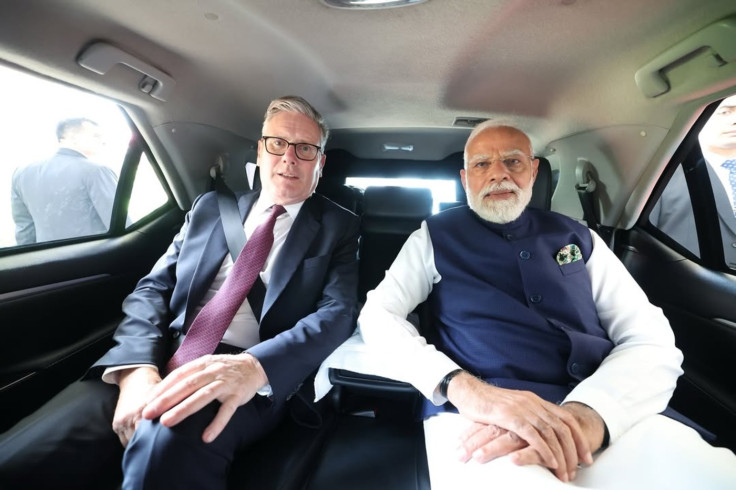Inside UK's £350 Million Bet On India: Starmer's Boldest Foreign Move Yet
Britain's bold bet: trade, tech, and trust in India's rise

When UK Prime Minister Keir Starmer landed in Mumbai recently, it was not just another diplomatic stop. It marked an important new chapter in UK-India relations with far-reaching implications. Backed by an enormous £350 million defence contract, a landmark trade pact, and a massive British delegation, Starmer's visit signalled that Britain now sees India not as a distant trading partner, but as a strategic axis for its future.
What Is The India-UK Deal About?
Both nations made it clear that this visit would not be symbolic diplomacy. The UK and India signed a £350 million contract under which Britain will supply lightweight multirole missiles to the Indian armed forces. The deal reorients defence ties between the two countries, making India a key buyer and partner in the British arms sector, while bolstering its own defence capabilities.
Moreover, the two countries advanced a collaboration in naval technologies, agreeing on a £250 million to jointly develop electric propulsion systems for Indian warships. It is a mutually beneficial deal that brings financial rewards for Britain and military might for India.
By placing defence hardware at the centre of his visit, Starmer appears to be making a calculated gamble—that arms sales can anchor a broader strategic partnership with a rising global power like India. It can also be seen as a shift from the traditional soft power diplomacy to hard-nosed geopolitics, and underlines how seriously the UK treats India on the world stage.
India And UK Partner Over All Sectors
Defence tech is just one facet of the UK's gambit. Underlying Starmer's visit is the India-UK Comprehensive Economic and Trade Agreement (CETA), signed in July 2025. The pact cuts tariffs and opens markets across sectors like whisky, textiles, medical devices and more.
The record-breaking trade delegation of 125 business leaders, university heads, and industry heavyweights seemingly builds momentum and locks in further gains. This even extends to the film industry, with Starmer reportedly stating, 'Bollywood is back in Britain, and it's bringing jobs, investment and opportunity, all while showcasing the UK as a world-class destination for global filmmaking.'
The returns on this massive deal are already being tallied. 'In the three months since we actually signed that (trade deal) ... we've seen a 6-billion-pound boost in trade and investment, that's on top of the increased numbers over the last year already,' Starmer said in a CEO forum in Mumbai. Al Jazeera reports that Starmer's office said 64 Indian companies committed to investing £1.3 billion into Britain, but has not given further details. On the Indian side, the deal is already unlocking trade growth, and it comes paired with plans to create joint AI and innovation centres, strengthen supply chains for critical minerals, and deepen technology links between the two nations.
Starmer's Global Play
Starmer did not stop at trade and technology. He also raised India's case for a permanent seat in the UN Security Council. Following his bilateral meeting with Prime Minister Narendra Modi, he said, 'We sit together in the Commonwealth, the G20, and we want to see India taking its rightful place on the UN Security Council too.'
This move aligns Starmer's geopolitical ambition with economic strategy. With India rising as a major global force, the stakes could not be higher.
While the UK-India pact might expand bilateral trade by £25.5 billion by 2040, its true value hinges on its execution. Whether this massive wager pays off will depend not just on signatures and soundbites, but on sustained cooperation and implementation in the years ahead.
© Copyright IBTimes 2025. All rights reserved.





















